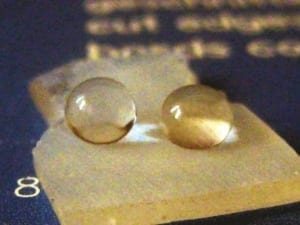
Car finish, to which no dirt particles adhere, house fronts, from which graffiti paints roll off, and shoes that remain clean on muddy paths – the material “fluoropore” might make all this possible. Both water and oil droplets roll off this new class of highly fluorinated super-repellent polymers.
The Federal Ministry of Education and Research (BMBF) has now decided to fund its further development at the KIT with EUR 2.85 million. Fundamental research in this area is aimed among others at making use of this new type of material for universal protective coatings.
The phenomenon is known from lotus plants as well as from cabbage leaves: Water droplets simply roll off. For some time, this classical lotus effect has been used technically for producing rough surfaces with special chemical properties. “However, this trick does not work for oils – the lotus plant repels water, but no oil,” Dr.-Ing. Bastian Rapp of the KIT Institute of Microstructure Technology (IMT) says. “Oil-repellent surfaces need to have another chemical structure, fluoropolymers are required for this purpose,” the scientist explains. Fluoropolymers are high-performance plastics with a high heat resistance and chemical stability. Teflon, the known anti-stick coating material for frying pans, belongs to this category of substances.
“When combining the chemical properties of fluoropolymers with the roughness of the lotus plant, surfaces are obtained, from which both water and oil droplets will roll off,” Rapp says. He has already succeeded in producing such super-repellent surfaces with the lotus 2.0 effect in the laboratory. In practical use, however, they turned out to have an insufficient stability. A big problem is sensitivity to abrasion. Rapp therefore works on developing a new class of fluorinated polymers, from which water and oil roll off and which are far more robust in practical application. These polymers, called “fluoropore”, are to possess the lotus 2.0 effect on nearly any surfaces.
The Latest on: Lotus effect
[google_news title=”” keyword=”Lotus effect” num_posts=”10″ blurb_length=”0″ show_thumb=”left”]
via Google News
The Latest on: Lotus effect
- Here’s a complete list of all the Miami area restaurants that have Michelin starson April 26, 2024 at 1:30 am
Miami boasts one two-star restaurant, the glamorous French spot L’Atelier de Joël Robuchon in the Design District, the only two-star restaurant in Florida. Thirteen other area restaurants have earned ...
- 6 Of The Best Cars Ever Built With Rotary Engineson April 25, 2024 at 9:15 pm
Even though the rotary engine never quite caught on, it has appeared in many notable vehicles. Here are six of the best cars ever built with rotary engines.
- The 11 Best Hair Growth Serums for Long, Strong Hairon April 25, 2024 at 12:26 pm
First, it helps to understand what’s causing your hair changes. “I encourage everyone with a concern for hair thinning or shedding to consult with a health-care provider first,” says Paradi Mirmirani, ...
- How Did Biscoff Cookies Become An Iconic Airplane Snack?on April 25, 2024 at 8:15 am
For some folks, no flight is complete without a complementary Biscoff cookie. But how did this sweet make its mark as an iconic airplane snack?
- Drake May Go to Court Over AI-Generated Tupacon April 25, 2024 at 7:35 am
Drake released a diss track against Kendrick Lamar over the weekend featuring AI-generated versions of West Coast legends Snoop Dogg and Tupac Shakur. Tupac’s estate sent Drake a letter on Wednesday ...
- The Most Curious Finds at Milan Design Weekon April 25, 2024 at 7:22 am
From ergonomic stemware to wireless track lighting, WWD highlights the novelties that set the tone at the latest design season.
- A weekend guide to Palermoon April 25, 2024 at 5:51 am
Fought over for centuries, the Sicilian capital has absorbed cultural influences over millennia and is being discovered anew ...
- The Best Purple Shampoos To Restore Your Hair’s Highlightson April 24, 2024 at 6:02 am
Find the secret weapon against brassy hair. Dive into our purple shampoo guide for tips on removing unwanted tones and achieving vibrant locks.
- The Best Under-the-Radar, Eco-Friendly Fashion & Beauty Brands that You Need to Knowon April 22, 2024 at 1:58 pm
These are the ethical and sustainable brands you may not be familiar with, but are definitely worth trying this Earth Day.
- A disorienting, masterful, shape-shifting novel about multiracial identityon April 22, 2024 at 9:19 am
Rachel Khong’s irresistible puzzle of a second novel suggests it is a mistake to think we can force complex, nature-nurture identities in a chosen direction.
via Bing News









